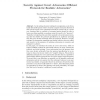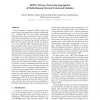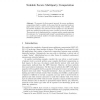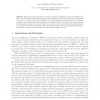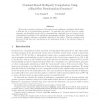107
click to vote
JOC
2010
14 years 8 months ago
2010
Abstract. In the setting of secure multiparty computation, a set of mutually distrustful parties wish to securely compute some joint function of their private inputs. The computati...
138
click to vote
USS
2010
14 years 12 months ago
2010
Secure multiparty computation (MPC) allows joint privacy-preserving computations on data of multiple parties. Although MPC has been studied substantially, building solutions that ...
136
click to vote
JOC
2007
15 years 1 months ago
2007
In the setting of secure multiparty computation, a set of mutually distrustful parties wish to securely compute some joint function of their inputs. In the stand-alone case, it ha...
130
click to vote
GRC
2008
IEEE
15 years 3 months ago
2008
IEEE
—Secure multiparty computation is a very important research topic in cryptography. A secure multi-party computation involves N untrusful parties. It takes input xi from the ith p...
123
click to vote
CTRSA
2008
Springer
15 years 3 months ago
2008
Springer
In the setting of secure multiparty computation, a set of mutually distrustful parties wish to securely compute some joint function of their private inputs. The computation should...
106
Voted
CRYPTO
2008
Springer
15 years 3 months ago
2008
Springer
We present the first general protocol for secure multiparty computation in which the total amount of work required by n players to compute a function f grows only polylogarithmical...
114
click to vote
CRYPTO
2006
Springer
15 years 5 months ago
2006
Springer
We present the first general protocol for secure multiparty computation which is scalable, in the sense that the amortized work per player does not grow, and in some natural settin...
114
click to vote
FC
2010
Springer
15 years 6 months ago
2010
Springer
Abstract We propose several variants of a secure multiparty computation protocol for AES encryption. The best variant requires 2200 + 400 255 expected elementary operations in expe...
102
click to vote
CRYPTO
2007
Springer
15 years 6 months ago
2007
Springer
Oblivious transfer (OT) is an essential building block for secure multiparty computation when there is no honest majority. In this setting, current protocols for n 3 parties requ...
133
click to vote
CRYPTO
2005
Springer
15 years 7 months ago
2005
Springer
We present a constant-round protocol for general secure multiparty computation which makes a black-box use of a pseudorandom generator. In particular, the protocol does not requir...
